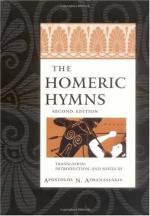M. Foucart has another argument, which does not seem more convincing, though it probably lights up the humorous or indecent side of the Eleusinia. Isocrates speaks of “good offices” rendered to Demeter by “our ancestors,” which “can only be told to the initiate.” {86b} Now these cannot be the kindly deeds reported in the Hymn, for these were publicly proclaimed. What, then, were the secret good offices? In one version of the legend the hosts of Demeter were not Celeus and Metaneira, but Dusaules and Baubo. The part of Baubo was to relieve the gloom of the Goddess, not by the harmless pleasantries of Iambe, in the Hymn, but by obscene gestures. The Christian Fathers, Clemens of Alexandria at least, make this a part of their attack on the Mysteries; but it may be said that they were prejudiced or misinformed. {87a} But, says M. Foucart, an inscription has been found in Paros, wherein there is a dedication to Hera, Demeter Thesmophoros, Kore, and Babo, or Baubo. Again, two authors of the fourth century, Palaephatus and Asclepiades, cite the Dusaules and Baubo legend. {87b}
Now the indecent gesture of Baubo was part of the comic or obscene folk-lore of contempt in Egypt, and so M. Foucart thinks that it was borrowed from Egypt with the Demeter legend. {87c} Can Isocrates have referred to this good office?—the amusing of Demeter by an obscene gesture? If he did, such gestures as Baubo’s are as widely diffused as any other piece of folk-lore. In the centre of the Australian desert Mr. Carnegie saw a native make a derisive gesture which he thought had only been known to English schoolboys. {88a} Again, indecent pantomimic dances, said to be intended to act as “object lessons” in things not to be done, are common in Australian Mysteries. Further, we do not know Baubo, or a counterpart of her, in the ritual of Isis, and the clay figurines of such a figure, in Egypt, are of the Greek, the Ptolemaic period. Thus the evidence comes to this: an indecent gesture of contempt, known in Egypt, is, at Eleusis, attributed to Baubo. This does not prove that Baubo was originally Egyptian. {88b} Certain traditions make Demeter the mistress of Celeus. {88c} Traces of a “mystic marriage,” which also occur, are not necessarily Egyptian: the idea and rite are common.
There remains the question of the sacred objects displayed (possibly statues, probably very ancient “medicine” things, as among the Pawnees) and sacred words spoken. These are said by many authors to confirm the initiate in their security of hope as to a future life. Now similar instruction, as to the details of the soul’s voyage, the dangers to avoid, the precautions to be taken, notoriously occur in the Egyptian “Book of the Dead.” But very similar fancies are reported from the Ojibbeways (Kohl), the Polynesians and Maoris (Taylor, Turner, Gill, Thomson), the early peoples of Virginia, {89a} the modern Arapaho and Sioux of the Ghost Dance rite, the Aztecs, and so forth.




